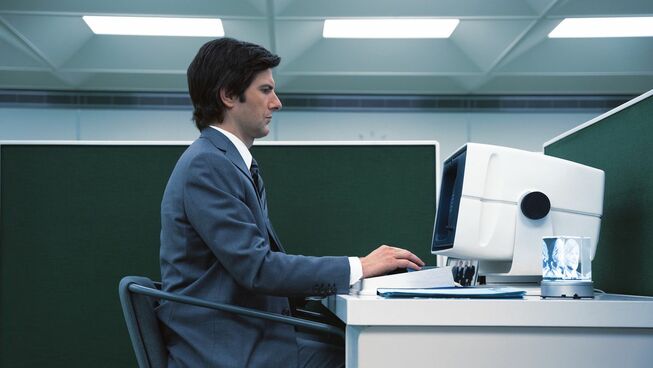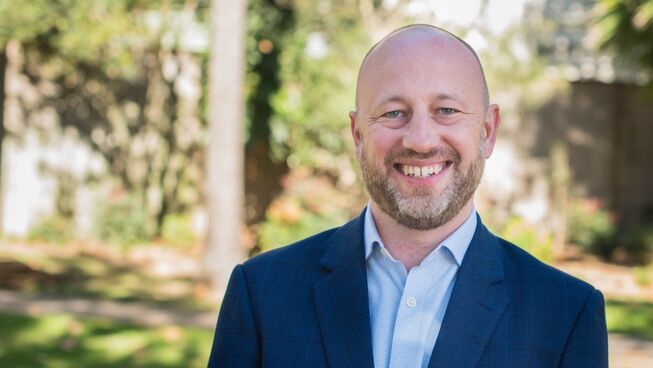Cutting Outie the middle man

Given it consumes so much of our waking hours, it should be little surprise that the workplace is the setting for many films and television series. But few have portrayed such a gripping and dystopic vision of it as the recent critically acclaimed series Severance.
At face value the premise of this series seems innocent (and perhaps for many, attractive) enough; a chance to gain true work-life balance. Of their own volition, employees of the organisation Lumon are given the choice to “sever” themselves, undergoing a simple procedure to separate their work self from the self that they are during the rest of their life. Their Innie (work self) has absolutely no idea about the life of their Outie – whether they are married, have children, what their hobbies and interests might be, and so on. Their Innie knows only of their daily work and the relationships in that space. And while the Outie is aware that they have chosen to be “severed”, they know nothing of their Innie’s work life, what they do, or indeed who they work with, such that if they were to bump into a colleague on the street (or indeed live next door to one) they would not recognise them.
However as the series progresses we slowly discover this premise is not as innocent as it seems. For example, key characters have chosen “severance” as a means of escaping the pain of something in their outside life; work becoming a haven where for eight hours a day they have no memory of this pain. And increasingly we are led to believe that the motives of Lumon are not as altruistic as first presented. The series challenges the excesses of capitalism, where the workers, far from being free, are actually trapped cogs in a machine. It questions the almost religious nature of some organisations, where company policy almost operates as a sacred text.
A split identity
However of all the workplace issues this series raises it is the notion of a separation between our work self, and who we are outside of work that I have found myself reflecting on most in the wake of watching this series, particularly as a Christian.
The mantra (another religious concept), “Take your whole self to work” has become a maxim of many workplaces over the past five years. And yet many workers express that the reality is far from this. Many of us become a different person when we walk through the doors of our workplace, or log on to a meeting with colleagues from home. I had never seen this in myself before, but my wife noticed while I was working from home the past two years that I’d adopt a “work voice” when I began talking to my colleagues! We dress differently for work than other settings. We take interests in new hobbies, or TV shows, or sports we may not ordinarily have an interest in so that we can engage with our colleagues. We perhaps even alter our diet because our colleagues might think our normal meals are weird.
Now some of these changes we might make are not entirely bad – there’s an appropriate level of professionalism that we should bring to our work that we don’t need to have in other areas of our life (maybe my work voice is ok!) However the informal act of severance many of us undertake as we enter our daily work has its problems, especially as a Christian.
A new, whole identity, in Christ
One of the tremendous blessings we have in Christ is a new identity; we are loved and delighted in children of God. What is said of Christ is now said of those of us who are in Him (Matthew 3:17). This is not a split identity – sometimes we are loved by God if we are performing to His standard, but if we mess up we’re viewed differently. No, this is our fixed and sure identity for all of time, because it is Christ’s identity given to us! And it is this identity that shapes who we are at all times and in all contexts, not just sometimes and in some contexts, of course including the person we are in our daily work.
Indeed, only Christians are truly free to “bring their whole self to work”, because we have a secure and sure identity that cannot be taken from us, irrespective of the opinion of others. Only Christians can truly avoid the discombobulation of trying to keep track of who I am in this setting, and who I am in that one. Indeed (as Severance goes on to explore) it is ultimately frustrating and dissatisfying, and even tormenting to live a severed life; a discombobulated life is no way to live!
The compelling witness of a whole self
Rather, there is a richness in being a whole self, warts and all. In my experience, when we don’t mask a part of who we are that we believe others won’t like, but are our true selves in Christ many people find this wonderfully refreshing. When we are honest about what brings us joy outside of our workday, honest about struggles and pain in our life outside of that context we are a richer (and indeed, more interesting) person for it. The kind of person that others find that they can be their whole selves with. So in addition to not experiencing the frustration and discomfort that inevitably comes in living a severed life, by being our whole self we create more opportunities to engage with our colleagues about the bigger questions of life, questions that might lead them to the answers which free them up too from living a severed life.
Questions to consider
In what ways do you see yourself living a severed life with your colleagues?
How can you remind yourself of the true identity you have in Christ which frees you from a split identity?
Think of people you know who don’t live a severed life. What do you find attractive about them?



